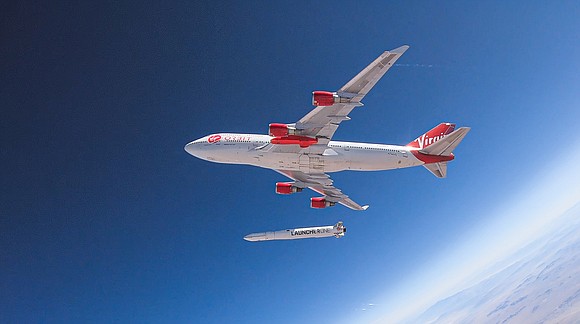Richard Branson's satellite-launching company Virgin Orbit to go public
CNN/Stylemagazine.com Newswire | 8/23/2021, 12:06 p.m.

Originally Published: 23 AUG 21 12:21 ET
By Jackie Wattles, CNN Business
(CNN) -- Virgin Orbit, the Richard Branson-backed startup that launches small satellites into space, will make its stock market debut later this year, adding another name to the long list of space-focused companies to go public via reverse merger.
The deal, expected to close in the last three months of 2021, will value Virgin Orbit at $3.2 billion and list the company on the NASDAQ under the ticker VORB.
Virgin Orbit is a separate entity from Virgin Galactic, the other space-focused Branson company, which specializes in suborbital space tourism and last month flew Branson himself up for a brief trip to the edge of space. Virgin Orbit spun off from Virgin Galactic in 2017, and the latter company went public via its own SPAC deal in 2019.
Virgin Orbit is solely focused on launching small batches of lightweight satellites into space using its air-launching method. So far, the company has completed three successful flights that've seen its 70-foot-long Launcher One rocket take off from beneath the wing of a Boeing 747 jet (nicknamed "Cosmic Girl") as it flies out over the Pacific Ocean.
SPACs, or special-purpose acquisition companies, have rapidly become a favorite means by which startups — particularly in experimental fields such as spaceflight or self-driving cars — debut on the stock market. SPACs work by taking what's essentially a shell company and listing it on the stock market for the public to invest in while the SPAC controllers search for an acquisition target.
The SPAC that will be taking over Virgin Orbit, for example, is called NextGen Acquisition Corp. II, which was founded by former Goldman Sachs and PerkinElmer excutives. NextGen made its stock market debut in March this year and had a market value of more than $500 million as of Monday morning.
Investors have traditionally been wary of SPAC companies because it has a reputation for attracting companies that couldn't go public with a more traditional IPO, which involves getting the backing of a major bank and clearing numerous regulatory hurdles. But Wall Street is in the midst of a SPAC craze spearheaded in large part by space companies ,such as Virgin Orbit's sister company Virgin Galactic, as well as prominent earth-imaging satellite company Planet and rocket startup Rocket Lab.
After Virgin Orbit's SPAC deal closes, existing investors in Virgin Orbit are expected to retain about 85% ownership over the company. Those investors include Virgin Group, which is essentially Branson's personal investment firm, Mubadala Investment Company, the Emirati sovereign wealth fund, as well as management and employees.
According to public filings posted Monday, Virgin Orbit has about $300 million worth of contracts already lined up, and it expects to be bringing in more than $2 billion in revenue per year by 2026 as it sells services to commercial satellite operators as well as government customers.



